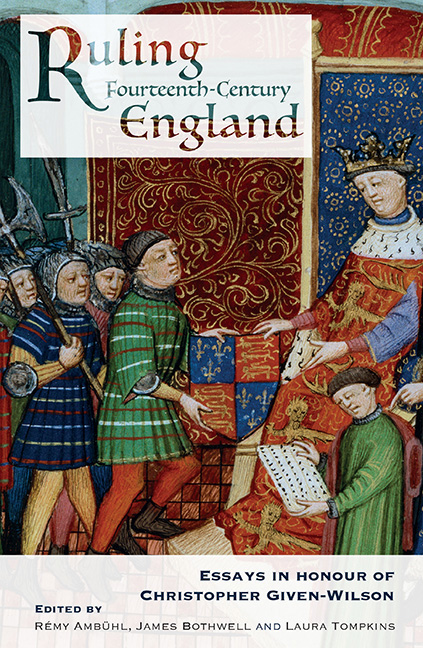Book contents
- Frontmatter
- Contents
- Contributors
- Abbreviations
- Introduction
- The Efficiency of English Royal Administration in the Last Years of Edward I
- Government and Market in the Early Fourteenth Century
- Kings' Clerks: The Essential Tools of Government
- Edward II: Favourites, Loyalty and Kingship
- The Perils of Lordship: The Life and Death of William Tuchet (c. 1275–1322)
- ‘War’, ‘Rebellion’ or ‘Perilous Times’? Political Taxonomy and the Conflict in England, 1321–2
- The Carlisle Roll of Arms and the Political Fabric of Military Service under Edward III
- What's in a Title? Comital Development, Political Pressures and Questions of Purpose in Fourteenth-Century England
- Edward the Black Prince: Lordship and Administration in the Plantagenet Empire
- ‘Said the Mistress to the Bishop’: Alice Perrers, William Wykeham and Court Networks in Fourteenth-Century England
- The Politics of Surrender: Treason, Trials and Recrimination in the 1370s
- Richard II in the Mirror of Christendom
- Bibliography
- Index
- Tabula Gratulatoria
Edward II: Favourites, Loyalty and Kingship
Published online by Cambridge University Press: 18 September 2019
- Frontmatter
- Contents
- Contributors
- Abbreviations
- Introduction
- The Efficiency of English Royal Administration in the Last Years of Edward I
- Government and Market in the Early Fourteenth Century
- Kings' Clerks: The Essential Tools of Government
- Edward II: Favourites, Loyalty and Kingship
- The Perils of Lordship: The Life and Death of William Tuchet (c. 1275–1322)
- ‘War’, ‘Rebellion’ or ‘Perilous Times’? Political Taxonomy and the Conflict in England, 1321–2
- The Carlisle Roll of Arms and the Political Fabric of Military Service under Edward III
- What's in a Title? Comital Development, Political Pressures and Questions of Purpose in Fourteenth-Century England
- Edward the Black Prince: Lordship and Administration in the Plantagenet Empire
- ‘Said the Mistress to the Bishop’: Alice Perrers, William Wykeham and Court Networks in Fourteenth-Century England
- The Politics of Surrender: Treason, Trials and Recrimination in the 1370s
- Richard II in the Mirror of Christendom
- Bibliography
- Index
- Tabula Gratulatoria
Summary
In the autumn of 1306 a group of twenty-two knights deserted the king's army in Scotland in order to pursue their martial interests elsewhere by participating in tournaments in France. Their impulsive behaviour can perhaps be understood, as, for all intents and purposes, the campaign for 1306 had come to an end and the aged king lay infirm at Lanercost, which he had only reached at Michaelmas. The Prince of Wales had himself departed Scotland in early autumn, travelling south in a leisurely fashion by way of Langley, Dover and Canterbury, and eventually spending Christmas with his two young halfbrothers at Northampton Castle. Nevertheless, despite the absence of the royal commanders and the lack of military activity, the dereliction of their duty by these knights would not be overlooked. Indeed, as if in anticipation of this very development, in the previous spring, on 6 April at Wolvesey, Edward I – himself an avid tournament knight in his youth4 – had issued a prohibition on tournaments, urging men instead to ‘prepare themselves to set out with the king for the parts of Scotland in as much strength as they can for the repression of the rebellion there’. This injunction was followed in the autumn by an order of 24 September to all the sheriffs in England further forbidding ‘tournaments, tiltings, jousts, or other deeds of arms, … until the king's war in Scotland be finished and until the king shall cause other ordinance to be made as to this’. The impetus for this further injunction, we are told, was that the king himself ‘understands that certain of his subjects make and propose to make tournaments … to the delay and hindrance of the king's affairs of Scotland’. Such individuals were to be considered ‘as his enemies and traitors and as hinderers of the expedition of his affairs’. Nonetheless, within three weeks of this supplementary order, the desertions had taken place.
When word of these desertions reached the king his reaction was both immediate and predictably severe. On 18 October 1306 orders went out to sheriffs across England to seize the lands and goods as well as the persons of the deserters.
- Type
- Chapter
- Information
- Ruling Fourteenth-Century EnglandEssays in Honour of Christopher Given-Wilson, pp. 77 - 92Publisher: Boydell & BrewerPrint publication year: 2019

